High performers, by definition, have a thirst for expanding their understanding, finding inspiration in the performance of others, challenging their current models of thinking, behaving and performance, expanding on their existing learning. Below you will find a hand-picked selection of books that, with one exception, are our favourites on a number of key subjects. Enjoy!
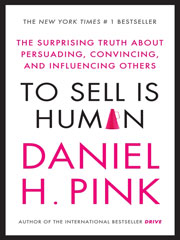
Life is all about pitching. The problem is that we're not very good at it. Each day millions of people earn their keep by convincing someone else to make a purchase. They sell planes to airlines, oil shares to sheiks, cars to drivers. They sell consulting agreements, magazine subscriptions, time-shares, double glazing, broadband, fitted kitchens, car insurance, life insurance, pet insurance! Some work in fancy offices with glorious views, others in dreary cubicles, but most look exactly like you.
In fact, each and every one of us spends time trying to persuade others to part with resources - money, time, attention - though most of the time we don't realise we're doing it. Parents sell their kids on going to bed. Spouses sell their partners on mowing the lawn or putting the cat out. We sell our bosses on giving us more money and more time off. And in astonishing numbers we go online to sell ourselves on Facebook, Twitter, Instagram, Tinder and Match.com profiles. What businesses, politicians and academics don't seem to have realised yet is that we're all in sales now.
In this book from the bestselling author of Drive, Daniel Pink explores the ways in which we can all improve our sales acumen in every area of our lives and identifies the three personal qualities and three essential skills necessary to move people. Relying on science rather than platitudes and analysis instead of exhortation, Pink shows that sales isn't what it used to be, that the low road of deceit and trickery is no longer a viable option, and that success in any kind of persuation or influence now depends on being more human.
Brimming with new and inspiring ideas on peddling, pitching and persuading, this book presents us with the tools and the tips to change the way we sell our products, our ideas and ourselves.
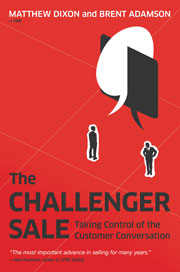
This book is included here not because it offers a "silver bullet" insight to selling, nor because it offers any fresh thinking. Rather it provides a useful packaging of thoughts about how to generate new business.
It debunks the concept of "relationship selling" whilst unhelpfully, and ironically, reinforcing "solution selling". Please read this with an interrogative mindset!
Now for the book jacket "blurb":-
In The Challenger Sale, Matthew Dixon and Brent Adamson share the secret to sales success: don't just build relationships with customers. Challenge them.
What's the secret to sales success? If you're like most business leaders, you'd say it's fundamentally about relationships - and you'd be wrong. The best salespeople don't just build relationships with customers. They challenge them.
Matthew Dixon, Brent Adamson, and their colleagues at CEB have studied the performance of thousands of sales reps worldwide. And what they discovered may be the biggest shock to conventional sales wisdom in decades.
The Challenger Sale argues that classic relationship-building is the wrong approach. Every sales rep in the world falls into one of five distinct profiles, and while all of these types of reps can deliver average performance, only one - the Challenger - delivers consistently high performance.
Instead of bludgeoning customers with facts and features, Challengers approach customers with insights about how they can save or make money. They tailor their message to the customer's specific needs. They are assertive, pushing back when necessary and taking control of the sale.
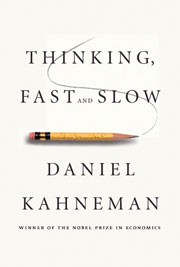
The New York Times Bestseller, acclaimed by author such as Freakonomics co-author Steven D. Levitt, Black Swan author Nassim Nicholas Taleb and Nudge co-author Richard Thaler, Thinking Fast and Slow offers a whole new look at the way our minds work, and how we make decisions.
Why is there more chance we'll believe something if it's in a bold type face?
Why are judges more likely to deny parole before lunch?
Why do we assume a good-looking person will be more competent?
The answer lies in the two ways we make choices: fast, intuitive thinking, and slow, rational thinking. This book reveals how our minds are tripped up by error and prejudice (even when we think we are being logical), and gives you practical techniques for slower, smarter thinking. It will enable to you make better decisions at work, at home, and in everything you do.

Psychologists have long been aware that most people tend to maintain an irrationally positive outlook on life. In fact, optimism may be crucial to our existence. Tali Sharot's original cognitive research demonstrates in surprising ways the biological basis for optimism.
In this fascinating exploration, she takes an in-depth, clarifying look at how the brain generates hope and what happens when it fails; how the brains of optimists and pessimists differ; why we are terrible at predicting what will make us happy; how anticipation and dread affect us; and how our optimistic illusions affect our financial, professional, and emotional decisions.
With its cutting-edge science and its wide-ranging and accessible narrative, The Optimism Bias provides us with startling new insight into how the workings of the brain create our hopes and dreams.
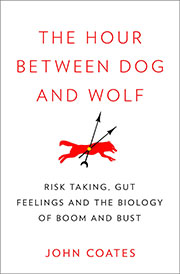
A successful Wall Street trader turned Cambridge neuroscientist reveals the biology of boom and bust and how risk taking transforms our body chemistry, driving us to extremes of euphoria and risky behaviour or stress and depression.
The laws of financial boom and bust, it turns out, have more than a little to do with male hormones. In a series of groundbreaking experiments, Dr. John Coates identified a feedback loop between testosterone and success that dramatically lowers the fear of risk in men, especially younger men—significantly, the fear of risk is not reduced in women. Similarly, intense failure leads to a rise in levels of cortisol, the antitestosterone hormone that lowers the appetite for risk across an entire spectrum of decisions.
The Hour Between Dog and Wolf expands on Coates's own research to offer lessons from the entire exploding new field—the biology of risk. He brings his research to life by telling a story of fictional traders who get caught up in a bubble and then a crash. As these traders place their bets and live with the results, Coates looks inside bodies to describe the physiology driving them into irrational exuberance and then pessimism. Risk concentrates the mind—and the body—like nothing else, altering our physiology in ways that have profound and lasting effects. What's more, biology shifts investors' risk preferences across the business cycle and can precipitate great change in the marketplace.
Though Coates's research concentrates on traders, his conclusions shed light on all types of high-pressure decision making-from the sports field to the battlefield. The Hour Between Dog and Wolf leaves us with a powerful recognition: To handle risk in a "highly evolved" way isn't a matter of mind over body; it's a matter of mind and body working together. We all have it in us to be transformed from dog into wolf; the only question is whether we can understand the causes and the consequences.

Every culture rests on a bedrock of folk wisdom handed down through generations. The pronouncements of philosophers are homespun by our grandmothers, and find their way into our common sense: what doesn't kill you makes you stronger. Do unto others as you would have done unto you. Happiness comes from within.
But are these 'truths' really true? Today we all seem to prefer to cling to the notion that a little bit more money, love or success will make us truly happy. Are we wrong?
In The Happiness Hypothesis, psychologist Jonathan Haidt exposes traditional wisdom to the scrutiny of modern science, delivering startling insights. We learn that virtue is often not its own reward, why extroverts really are happier than introverts, and why conscious thought is not as important as we might like to think...
Drawing on the rich inspiration of both philosophy and science, The Happiness Hypothesis is a remarkable, original and provocative book - ancient wisdom in our time.

The number one practical guide to making your family life less stressful and more rewarding. In this international bestseller, experts Adele Faber and Elaine Mazlish provide effective step by step techniques to help you improve and enrich your relationships with your children.
Everything in this book applies to the world of work! Essential reading. It should be mandatory.

Forget everything you thought you knew about how to motivate people - at work, at school, at home. It is wrong. As Daniel H. Pink explains in his paradigm-shattering book Drive, the secret to high performance and satisfaction in today's world is the deeply human need to direct our own lives, to learn and create new things, and to do better by ourselves and the world. Along the way, he takes us to companies that are enlisting new approaches to motivation, and introduces us to the scientists and entrepreneurs who are pointing a bold way forward.
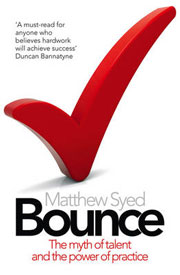
Essential reading following an astounding summer of sport; if you’ve ever wondered what makes a champion, Bounce has the answer.
What are the real secrets of sporting success, and what lessons do they offer about life? Why doesn’t Tiger Woods “choke”? Why are the best figure skaters those that have fallen over the most and why has one small street in Reading produced more top table tennis players than the rest of the country put together.
Two-time Olympian and sports writer and broadcaster Matthew Syed draws on the latest in neuroscience and psychology to uncover the secrets of our top athletes and introduces us to an extraordinary cast of characters, including the East German athlete who became a man, and her husband – and the three Hungarian sisters who are all chess grandmasters. Bounce is crammed with fascinating stories and statistics.
Looking at controversial questions such as whether talent is more important than practice, drugs in sport (and life) and whether black people really are faster runners, the mind-bending Bounce is a must-read for the hardened sports nut or brand new convert.

Do you sabotage your own happiness and success? Are you struggling to make sense of yourself? Do your emotions sometimes dictate your life?
The Chimp Paradox is an incredibly powerful mind management model that can help you become a happy, confident, healthier and more successful person. Dr Steve Peters explains the struggle that takes place within your mind and then shows how to apply this understanding to every area of your life so you can:
Recognise how your mind is working
Understand and manage your emotions and thoughts
Manage yourself and become the person you would like to be
The Chimp Mind Management Model is based on scientific facts and principles, which have been simplified into a workable model for easy use. It will help you to develop yourself and give you the skills, for example, to remove anxiety, have confidence and choose your emotions. The book will do this by giving you an understanding of the way in which your mind works and how you can manage it. It will also help you to identify what is holding you back or preventing you from having a happier and more successful life.
Each chapter explains different aspects of how you function and highlights key facts for you to understand. There are also exercises for you to work with. By undertaking these exercises you will see immediate improvements in your daily living and, over time, you will develop emotional skills and practical habits that will help you to become the person that you want to be, and live the life that you want to live.

What if everything you know about raw talent, hard work, and great performance is wrong? Few, if any, of the people around you are truly great at what they do. But why aren't they? Why don't they manage businesses like Jack Welch or Andy Grove, play golf like Tiger Woods or play the violin like Itzhak Perlman?
Asked to explain why a few people truly excel, most of us offer one of two answers: hard work or a natural talent. However, scientific evidence doesn't support the notion that specific natural talents make great performers.
In one of the most popular Fortune articles in years, Geoff Colvin offered new evidence that top performers in any field - from Tiger Woods and Winston Churchill to Warren Buffett and Jack Welch - are not determined by their inborn talents.
Greatness doesn t come from DNA but from practice and perseverance honed over decades.And not just plain old hard work, but a very specific kind of work. The key is how you practice, how you analyze the results of your progress and learn from your mistakes, that enables you to achieve greatness.
Now Colvin has expanded his article with much more scientific background and real-life examples. He shows that the skills of business negotiating deals, evaluating financial statements, and all the rest obey the principles that lead to greatness, so that anyone can get better at them with the right kind of effort. Even the hardest decisions and interactions can be systematically improved.
This new mind-set, combined with Colvin's practical advice, will change the way you think about your job and career and will inspire you to achieve more in all you do.
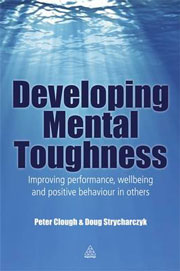
Mental toughness is about how effectively individuals respond to stress, pressure and challenge. Understanding this concept is essential to improving performance for both the individual and organization, and this ground-breaking book explains mental toughness clearly and effectively. Tracing its development from sports psychology into the world of business, health and education, Developing Mental Toughness is the first book to look at mental toughness and its application at the organizational level.
Written for anyone coaching individuals and teams for improved performance, Developing Mental Toughness contains practical guidance on delivering techniques that will radically improve people's abilities to harness the effects of stress and pressure.
Full of sample exercises and case studies, this book also features the Mental Toughness Questionnaire - a unique self-assessment tool to determine your mental toughness score. You can find more information about the mental toughness measure online at www.aqr.co.uk.
(Jon Wareing is accredited by AQR as a licenced user of the MTQ48 and is able to use the Mental Toughness Questionnaire as part of your coaching programmes and as a feature of the Triple E "Thinking and Executing Correctly Under Pressure" Programme.)
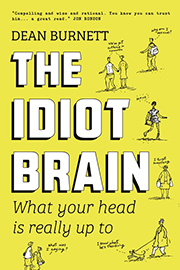
Why do you lose arguments with people who know much less than you? Why can you recognise that woman, from that thing...but can't remember her name? And why, after your last break-up, did you find yourself in the foetal position on the sofa for days, moving only to wipe the snot and tears haphazardly from your face? Here's why: the idiot brain. For something supposedly so brilliant and evolutionarily advanced, the human brain is pretty messy, fallible and disorganised. For example, your memory is egotistical. No, really. Conspiracy theories and superstitions are the inevitable effects of a healthy brain. And alcohol can actually improve your memory.
In The Idiot Brain, neuroscientist Dean Burnett tours our mysterious and mischievous grey (and white) matter. Along the way he explains the human brain's imperfections in all their glory and how these influence everything we say, do and experience. Expertly researched and entertainingly written, this book is for anyone who has wondered why their brain appears to be sabotaging their life, and what on earth it is really up to.
For coaching clients over the last 10 years who have been asking for one neat summary of all the various insights that I share about the brain in an easy to read and humourous digest - your wishes have been answered. This is the book.
If you want something a little harder, but not as severe as Thinking Fast and Slow, try You Are Not So Smart!
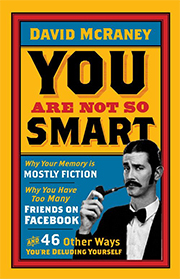
You and I spend most of our lives going around believing that we are rational, logical beings who make carefully weighted decisions based on objective facts in stable circumstances. Of course, as both a growing body of research and our own retrospective experience demonstrate, this couldn’t be further from the truth.
In You Are Not So Smart (based on the blog of the same name that preceded it) David McRaney focuses attention on debunking the many ways in which our minds play tricks on us and the false interpretations we have of those trickeries.
You Are Not So Smart reveals that every decision we make, every thought we contemplate, and every emotion we feel comes with a story we tell ourselves to explain them. But often these stories aren’t true. Each short chapter – covering topics such as Procrastination, Learned Helplessness, Selling Out, Social Loafing and the Illusion of Transparency – is like a psychology course with all the boring parts taken out. Not that it is easy reading! But strongly recommended nonetheless; as is the follow up title You Are Now Less Dumb: How to Conquer Mob Mentality, How to Buy Happiness, and All the Other Ways to Outsmart Yourself
"The central theme is that you are the unreliable narrator in the story of your life. And this is because you're unaware of how unaware you are," says McRaney. "It's fun to go through legitimate scientific research and pull out all of the examples that show how everyone, no matter how smart or educated or experienced, is radically self-deluded in predictable and quantifiable ways."
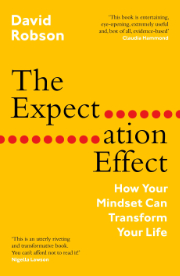
The Expectation Effect is a journey through the cutting-edge science of how our mindset shapes every facet of our lives, revealing how your brain holds the keys to unlocking a better you.
In this award-winning book, David Robson takes us on a tour of the cutting-edge research that reveals the many profound ways that our expectations shape our experience. Bringing together fascinating case studies and evidence-based science, The Expectation Effect uncovers new techniques that we can all use to improve our fitness, productivity, intelligence, health and happiness.
Of course, you can’t just think yourself thinner, happier or fitter, but using this book you can reframe many different facets of your life, and in so doing start real psychological, physiological and behavioural change. These easy-to-use skills will help you on your way to becoming the person you want to be, living the life you want to live.
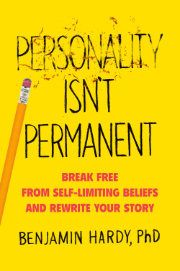
In Personality Isn’t Permanent, Dr. Benjamin Hardy draws on psychological research to demolish the popular misconception that personality—a person’s consistent attitudes and behaviours—is innate and unchanging. Hardy liberates us from the limiting belief that our “true selves” are to be discovered, and shows how we can intentionally create our desired selves and achieve amazing goals instead. He offers practical, science-based advice to for personal-reinvention.
The most important aspect of this book is the debunking of personality tests such as Myers-Briggs which he shows are not only psychologically destructive but are no more scientific than horoscopes!
The book is excellent in framing how to design your current identity based on your desired future self and how make decisions here-and-now through your new identity.
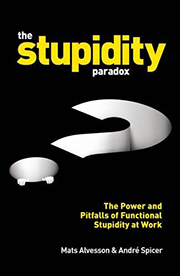
Functional stupidity can be catastrophic. It can cause organisational collapse, financial meltdown and technical disaster. And there are countless, more everyday examples of organisations accepting the dubious, the absurd and the downright idiotic, from unsustainable management fads to the cult of leadership or an over-reliance on brand and image. And yet a dose of stupidity can be useful and produce good, short-term results: it can nurture harmony, encourage people to get on with the job and drive success. This is the stupidity paradox.The Stupidity Paradox tackles head-on the pros and cons of functional stupidity. You'll discover what makes a workplace mindless, why being stupid might be a good thing in the short term but a disaster in the longer term, and how to make your workplace a little less stupid by challenging thoughtless conformity. It shows how harmony and action in the workplace can be balanced with a culture of questioning and challenge. The book is a wake-up call for smart organisations and smarter people. It encourages us to use our intelligence fully for the sake of personal satisfaction, organisational success and the flourishing of society as a whole.
Coaching clients, you will find an excellent summary of many of the sources of interference that Triple E seeks to arm you against. There is now an alternative epithet for the Triple E approach – Anti-Stupidity Leadership.
This book is a great read, insightful and ultimately both comical and tragic at the same time. It is important to keep in mind that you do not have to be a victim of "functional stupidity", in any of its guises.
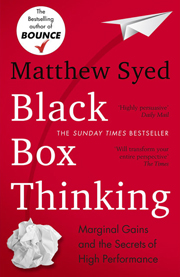
Black Box Thinking is a new approach to high performance, a means of finding an edge in a complex and fast-changing world. It is not just about sport, but has powerful implications for business and politics, as well as for parents and students. In other words, all of us.
Drawing on a dizzying array of case studies and real-world examples, together with cutting-edge research on marginal gains, creativity and grit, Matthew Syed tells the inside story of how success really happens – and how we cannot grow unless we are prepared to learn from our mistakes.
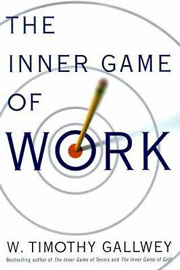
The best-selling author of The Inner Game of Tennis and The Inner Game of Golf reveals an approach to Focus, Learning, Pleasure, and Mobility in the Workplace. The Inner Game of Work challenges you to re-examine your fundamental motivations for going to work in the morning and your definitions of work once you’re there. You will be able to look at work in a whole new way.
The Inner Game of Work is a truly seminal work, giving rise to the definition of Performance = Potential - Interference.
Essential reading for any leader serious about coaching.
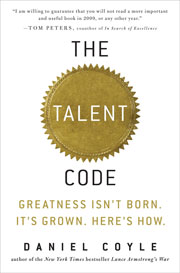
'Talent. You've either got it or you haven't.' Not true, actually.
In The Talent Code, award-winning journalist Daniel Coyle draws on cutting-edge research to reveal that, far from being some abstract mystical power fixed at birth, ability really can be created and nurtured.
In the process, he considers talent at work in venues as diverse as a music school in Dallas and a tennis academy near Moscow to demostrate how the wiring of our brains can be transformed by the way we approach particular tasks. He explains what is really going on when apparently unremarkable people suddenly make a major leap forward. He reveals why some teaching methods are so much more effective than others. Above all, he shows how all of us can achieve our full potential if we set about training our brains in the right way.

This insightful read blows apart the artefact of the "9 to 5" working hours paradigm and shows that success doesn't demand longer, harder hours, it demands that you work less.
For most of us, overwork is the new normal and rest is an afterthought. In our busy lives, rest is defined as the absence of work: late-night TV binges, hours spent trawling the internet, something to do once we've finished everything else on our to-do lists. But dismissing rest stifles our ability to think creatively and truly recharge.
In Rest, Silicon Valley consultant Alex Pang argues that we can be more successful in all areas of our lives by recognizing the importance of rest: working better does not mean working more, it means working less and resting better. Treating rest as a passive activity secondary to work undermines our chances for a rewarding and meaningful life.
Whether by making space for daily naps, as Winston Churchill did during World War II or going on hours-long strolls like Charles Darwin, pursuing what Karl Anders Ericcson (of 10,000 hours "Deliberate Practice" Fame) calls "Deliberate Rest" is the true key to fulfillment and creative success. “Deliberate practice,” noted Ericcson “is an effortful activity that can be sustained only for a limited time each day.” Practice too little and you never become world-class. Practice too much, though, and you increase the odds of being struck down by injury, draining yourself mentally, or burning out.
Drawing on rigorous scientific evidence and revelatory historical examples, Rest overturns everything our culture has taught us about work and shows that only by resting better can we start living better.
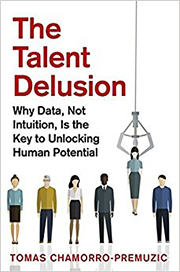
One of the many useless and value-destroying concepts McKinsey has unleashed on the world is the notion of a war for talent, the idea that since people are the critical asset of organisations, organisations' success depends on attracting, motivating and retaining top employees.
Whilst the book does little, in our view, to separate the notion of learned "capability", through high quality deliberate practice, from the common meaning of talent as genetically acquired ability, it punctures the abundance of pseudoscientific nonsense written and spouted about the use of psychology in the context of people development.
As Chamorro-Premuzic writes "Perhaps more problematically, the wider appeal of talent as a topic of public interest, and a key theme in self-management and career development conversations, has added a great deal of noise to the literature in this field. Indeed, the leadership development and talent management industries have largely been corrupted by wishy-washy advice from self-proclaimed experts and unqualified gurus. Thinking around talent has been hijacked by the self-help movement, and the result is a proliferation of populist and toxic advice, ungrounded in science yet highly effective at misleading HR practitioners and decision-makers in their talent-related activities.
In addition, the book provides some succinct insights around the poor coachability of many business leaders, who labour away under the burden of their "illusory superiority" and "blind spot" biases, desperately propping up the delusion of their own greatness, at the cost of reduced organisational quality and productivity and in turn driving value destruction for customers, colleagues, communities and shareholders alike.

This book contains perhaps the most comprehensive and systematic approach for achieving high performance, and thereby delivering successful outcomes, committed to print.
Walsh was an outsider for many reasons, but ultimately his rejection of the macho/heroic "outcome focussed" culture of his native USA was in many ways the most threatenting aspect of his teaching to "traditionalists".
Demonstrating, relentlessly, that there was a better way is a lesson that much of corporate culture is still yet to take on board.
Walsh's story also chillingly demonstrates the consequences of failing to maintain one of one's own standards. In Walsh's case a failure to "show self-control, especially where it counts most – under pressure" resulted in his needing to step away from the game that he fell out of love with – paying a heavy personal price.
The honesty with which this book addresses Walsh's flaws serves to underscore the veracity of his insights and strengthens the value of his philosophy.
From the Book Jacket: Bill Walsh is a towering and transformative figure in the history of the NFL. His advanced leadership concepts transformed the San Francisco 49ers from the worst franchise in sports to a legendary dynasty. In the process, he changed the way football is played.
Prior to his death, Walsh granted a series of exclusive interviews to bestselling author Steve Jamison. These became his ultimate lecture on leadership, illustrated by dramatic anecdotes from throughout his career.
Bill Walsh taught that the requirements of successful leadership are the same whether you run an NFL franchise, a fortune 500 company, or a hardware store with 12 employees. These final words of 'wisdom by Walsh' will inspire, inform, and enlighten leaders in all professions.

In 2015 the New Zealand All Blacks became the first team to win back to back World Cups in Rugby Union marking completion of a strategic priority set out in their Strategy Document Toward 2016, that was launched back in March 2013.
Rarely does a universally acclaimed high performing team like the All Blacks reveal their innermost secrets. But in 2010, New Zealander James Kerr was given access to the All Blacks camp and was allowed to lift the veil slightly and offer a glimpse of exactly how they make the magic happen.
What he found was captured in a book: Legacy - 15 Lessons in Leadership: What the All Blacks Can Teach Us About the Business of Life published late in 2013. Too late to give advantage to competitors, but galling nonetheless that their foes knew in advance the recipe that was driving the All Blacks performance.
Synopsis: Champions do extra. They sweep the sheds. They follow the spearhead. They keep a blue head. They are good ancestors. In Legacy, best-selling author James Kerr goes deep into the heart of the world's most successful sporting team, the legendary All Blacks of New Zealand, to reveal 15 powerful and practical lessons for leadership and business.
Legacy is a unique, inspiring handbook for leaders in all fields, and asks: What are the secrets of success - sustained success? How do you achieve world-class standards, day after day, week after week, year after year? How do you handle pressure? How do you train to win at the highest level? What do you leave behind you after you're gone? What will be your legacy?
Along with The Score Takes Care of Itself, Legacy; is essential reading for leaders.

As Walker describes it, this book explores why we sleep in a narrative arc in four main parts.
“Part 1 demystifies this beguiling thing called sleep: what it is, what it isn’t, who sleeps, how much they sleep, how human beings should sleep (but are not), and how sleep changes across your life span or that of your child, for better and for worse.
Part 2 details the good, the bad, and the deathly of sleep and sleep loss. We will explore all of the astonishing benefits of sleep for brain and for body, affirming what a remarkable Swiss Army knife of health and wellness sleep truly is. Then we turn to how and why a lack of sufficient sleep leads to a quagmire of ill health, disease, and untimely death—a wakeup call to sleep if ever there was one.
Part 3 offers safe passage from sleep to the fantastical world of dreams scientifically explained. From peering into the brains of dreaming individuals, and precisely how dreams inspire Nobel Prize-winning ideas that transform the world, to whether or not dream control really is possible, and if such a thing is even wise - all will be revealed.
Part 4 seats us first at the bedside, explaining numerous sleep disorders, including insomnia.”
An excellent, if at times sobering, explanation of the essential role of sleep in physical preparation for high performance.
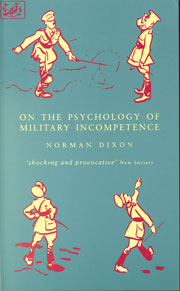
This unique and penetrating book surveys 100 years of military inefficiency from the Crimean War, through the Boer conflict, to the disasterous campaigns of the First World War and the calamities of the Second.
It examines the social psychology of military organisations, provides case studies of individual commanders and identifies an alarming pattern in the causes of military disaster.
Salutary reading for the would be strategist.
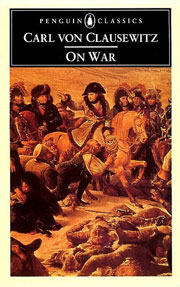
In his famous treatise On War Carl von Clausewitz may be said to have distilled Napoleon into theory. He is best remembered for his pronouncement that war is a continuation of politics by other means and for his observations on total war; but modern strategists who profess to apply his doctrines would do well to read him again.
For Clausewitz, as Professor Rapoport contends, made a distinction between judicious and injudicious war, and the relationship he detected between was and politics really means that war can only be waged in certain circumstances.
Formative reading for the would be strategist.
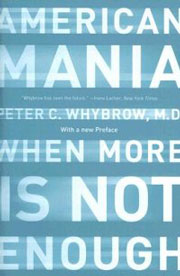
Despite an astonishing appetite for life, more and more Americans are feeling overworked and dissatisfied. In the world’s most affluent nation, epidemic rates of stress, anxiety, depression, obesity and time urgency are now grudgingly accepted as part of everyday existence—they signal the American Dream gone awry.
Peter Whybrow, Director of the Neuropsychiatric Institute at UCLA, grounds the extraordinary achievements and excessive consumption of the American nation in an understanding of the biology of human craving and the reward system of the brain—offering for the first time a comprehensive explanation for the addictive mania of consumerism. Whybrow’s analysis combines careful reflection on the roots of American culture as a laissez faire competitive free market economy, with an exploration of the nation’s migrant temperament and its role in the creation of our ambitious, restless society. Taking into account our ancestral biology, he sheds critical light on the dangerous misfit emerging between our consumer-driven culture and the brain systems that evolved to deal with privation 200,000 years ago.
In the absence of any controls—any cultural or economic constraints—we are easily hooked on our acquisitive pleasure seeking behaviors. Whybrow shows how human biology is ill equipped to cope with the demands of the 24/7, global, information-saturated, rapid-fire culture we not only have created, but that we have come to crave. Drawing upon rich scientific case studies and fascinating portraits, American Mania presents a clear and novel vantage point from which to understand the most pressing social and medical issues of our time, and also offers readers an informed approach to addressing these problems in their individual lives.

Statisticians, in the telling of Peter L. Bernstein, are nothing less than Promethean heroes. He argues that the people who mastered the calculation of probabilities, beginning in 16th century Italy, stole from the gods something more precious than fire--namely, the understanding of risk. We can't see the future, of course, Bernstein writes in Against the Gods: The Remarkable Story of Risk. But by calculating probabilities, we can do the next best thing: make intelligent decisions--and take control of our lives--on the basis of scientific forecasts. The mastery of risk is the foundation of modern life, he contends, from insurance to the stock market to engineering, science, and medicine.
A Business Week, New York Times Business, and USA Today Bestseller.
"Ambitious and readable . . . an engaging introduction to the oddsmakers, whom Bernstein regards as true humanists helping to release mankind from the choke holds of superstition and fatalism." – The New York Times
"An extraordinarily entertaining and informative book." – The Wall Street Journal
"A lively panoramic book . . . Against the Gods sets up an ambitious premise and then delivers on it." – Business Week
"Deserves to be, and surely will be, widely read." – The Economist
"[A] challenging book, one that may change forever the way people think about the world." – Worth
"No one else could have written a book of such central importance with so much charm and excitement." – Robert Heilbroner author, The Worldly Philosophers
"With his wonderful knowledge of the history and current manifestations of risk, Peter Bernstein brings us Against the Gods. Nothing like it will come out of the financial world this year or ever. I speak carefully: no one should miss it." – John Kenneth Galbraith Professor of Economics Emeritus, Harvard University
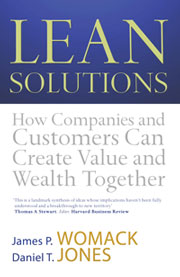
A massive disconnect exists today between consumers and providers.
As consumers, we have a greater selection of higher quality goods and services to choose from, yet our experience of obtaining and using these items is more frustrating than ever.
At the same time, companies find themselves with declining customer loyalty, greater challenges in fulfilling orders, and a general sense of dissatisfaction in connecting with their customers.
In "Lean Solutions", lean production experts Womack and Jones show consumers and companies alike how they can align their goals to achieve greater value with less waste.